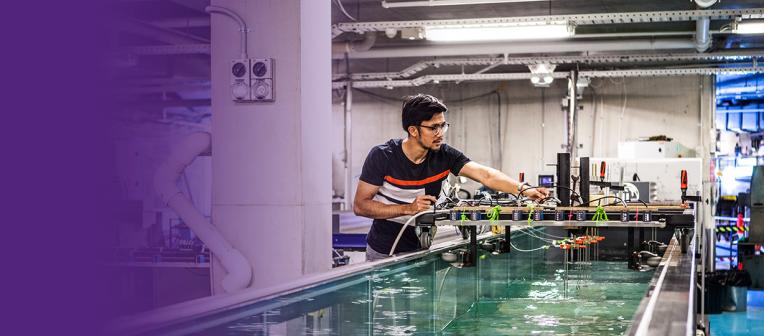

Is it possible to earn a PhD while working? The brutal truth
Working alongside your PhD seems like an attractive proposal until you look at all of the different commitments you need to make to actually get a PhD and submit your dissertation. Working part-time may help PhD students financially but it often comes at an academic cost.
It is possible to earn a PhD while working. However, it requires strict time management and can be very complicated. You have to balance any other significant commitments inside and outside of your PhD.
A PhD is typically the equivalent time commitment as a full-time job. The majority of the PhD students I know work at least 40 hours a week. So, trying to get a PhD while working is very time intensive – 80-hour + weeks.
Some students drop down to a part-time PhD in order to balance all of the particular commitments of a PhD program and working hours.
Whether or not you are a part-time PhD student or you are studying your PhD full-time, here are all of the aspects you should consider if you are considering working alongside your PhD research. This is what you need to know if you are considering getting your doctorate while working.
Can you work during a PhD?
Some institutions full-out ban their PhD students from working full-time alongside a full-time research commitment. They want to make sure that you’re working 100% on your PhD because balancing work isn’t easy.
Although it may not be banned in some institutions it is generally expected that students focus on their research and coursework full-time during a PhD and are therefore not typically able to hold down a full-time job.
Some programs may allow for part-time work, but it is generally not recommended as it can interfere with academic progress.
Additionally, many PhD programs offer funding in the form of stipends or fellowships which can help support students financially during their studies.
There are a few things to consider if you are thinking of working during your PhD.
The first is whether or not you will have enough time to dedicate to both your work and your studies. You don’t want your work to suffer because you are spending too much time on your PhD, or vice versa.
Another thing to consider is how working will affect your funding.
If you are receiving PhD funding or a scholarship from an external source, they may have stipulations on whether or not you can work while receiving their funding. Be sure to check with them before taking on any paid work.
Lastly, you will want to make sure that the work you are doing is related to your field of study. Working in a related field can help you with your research by giving you real-world experience that you can apply to your studies.
Even though some institutions allow you to work, should you?
Should you work during your PhD?
Some students feel that they need to work in order to support themselves during their PhD, while others feel that they can focus solely on their studies.
There are pros and cons to both approaches.
| Pros | Cons |
|---|---|
| Experience outside of academia | Distraction from completion |
| Improved finances | Takes much longer (at least twice as long) |
| Escape from academic work | Increase risk of burnout |
| Networking | Extra people to coordinate with |
| Increase in time pressures | |
| Balancing expectations of job and academia |
Working during your PhD can help you to cover your living expenses and may even allow you to save some money. However, it can also be a distraction from your studies and may make it more difficult to find time to do research.
I know that I wouldn’t be able to balance the pressures of a full-time job with my PhD studies and, therefore, decided to not have any jobs during my first year – this included jobs inside the University such as demonstrating in undergraduate laboratories.
Therefore, it is possible to do a PhD whilst working full-time but you really have to consider the impact of the extra pressures and commitments
. It is much easier to work alongside your PhD if you have a strong research-based masters degree and your job outside of your degree is flexible enough to allow you to attend different academic commitments such as attending seminars, meeting with advisers, and travelling to conferences.
Ultimately, the decision of whether or not to work during your PhD is up to you.
Consider your financial situation and how working would impact your studies before making a decision.
It can be difficult to juggle work and study commitments, and you may find yourself feeling overwhelmed and stressed. You may also have less time to socialize and enjoy your student life.
So, it’s important to think carefully about whether working during your PhD is right for you.
What type of work can you do during a PhD? Part time or Full time?
During your PhD there are a number of different options that you could consider if you want to (and you are allowed to) get a job.
I do not recommend working full-time alongside your PhD but, there are some options for part-time work to earn a little bit of money alongside your studies.
Full time work
My recommendation is that you do not try to fit a PhD alongside full-time work. Trying to work full time is asking for trouble.
There will be so many more pressures on you that it will not be a very enjoyable experience.
A PhD requires you to be creative.
Creativity comes from having enough mental space to allow your mind to connect new and interesting ideas together. If you are busy with work you will not have the mental capacity to be able to do this effectively.
Therefore, I recommend that you consider at least dropping down to part-time work if you are insistent on pursuing a PhD alongside employment.
I have seen PhD students complete a PhD part-time supported and partly funded by their current place of employment.
Part time work
If you want to know more about the best PhD student part-time jobs check out my full guide – click here for the full article.

There are a variety of part-time jobs that can easily supplement your income during a PhD.
The best PhD student part-time jobs will have flexible hours, provide you with a reasonable hourly rate, and not distract you from your primary goal of completing your PhD.
I have highlighted in my YouTube video, below, all of the different side hustles that PhD students can try if they need to earn a little bit more money.
The common part-time jobs for PhD students include:
- Hospitality
- Customer service
- University-based jobs – such as tutoring, marking exams, student services and working in laboratories
- Online jobs such as user testing, notetaker, and translating.
- Freelancing. Selling a skill that you have two people on services such as Upwork .
Why Should You Worry About Working During Your PhD
There are a number of reasons why you should worry about working during your PhD.
The most important is balancing workload, the fact that you were extending your time in academia by a significant amount, the increased risk of burnout, and ensuring you have enough resources to keep you going for multiple years.
A PhD is just like a full time job.
Therefore, getting a PhD while working full-time will be incredibly difficult. Both commitments will require at least 40 hours per week each.
Nonetheless, if you are able to have full flexibility on your work schedule and you are capable of distance learning for some part of your PhD it may be much more possible.
Many PhD students struggle with just the commitments of earning a doctorate. Consider working alongside your PhD very carefully.
Time it takes
A PhD will typically take between three and seven years. During this time it is extremely stressful and you need to make sure you’re capable of researching at your best for the entire time.
I have always said that a PhD is a marathon and not a sprint. Adding extra years to your PhD if you need to can be worth it. However, you must consider the amount of time it will take you to get your PhD and the potential return on that investment.
Unless you have a particular career secured or in mind for after your PhD the extra years it takes to complete a doctoral degree part-time are generally not worth it.
Burnout is a real consequence of doing a PhD.
By working alongside your PhD you’ll increase your chances of burnout significantly. This is true even if you like to study.
If you are prone to feelings of being overwhelmed I would stay away from earning a PhD whilst working full or part-time.
Slowly introduce part-time work if you need to once you have settled into the general routine of your PhD.
Tips for Earning Your PhD While Working
Here are a few general tips that may help you if you find yourself having to work alongside your PhD:

Talk to everyone involved
Everyone involved in this process needs to be on board. There will be times when you need to ask favours from your supervisor, colleagues, work supervisor or others.
Don’t be afraid to ask for help: Whether it’s from your supervisor, colleagues, or friends and family, don’t hesitate to ask for help when you need it.
This is not a sign of weakness, but simply a recognition that we all need assistance from time to time.
Stay Organized and on Track
Find a routine: Try establishing a set schedule for at least most days of the week and stick to it as much as possible. This will help you to stay focused and make the most of your limited time.
Get Involved in the Research Community
Remember to stay in touch with your research community.
Working part-time or full-time can mean that you miss out on the exciting recent advancements and collaboration with people in your field. Make an extra special effort to attend seminars, talks, and networking events to help progress your research and your academic career.
Don’t squirrel yourself away!
Work with your strengths
Know yourself: Be honest about how well you work under pressure and how much free time you realistically have.
If you know that you work better with a tight deadline, then try to structure your work schedule accordingly.
Personally, I need as much free mental space is possible to perform at my best. Just do what is best for you.
Wrapping up
This article has been through everything you need to consider if you are tempted by earning a PhD while working.
Your PhD programme may dictate whether it is possible to work alongside your PhD. Whether or not it is a good idea will be down to you and if you are able to balance an insane amount of commitments and work.
My general recommendation is that you should focus 100% on your PhD journey and although it is definitely possible you’re going to be at risk of burnout.
Combining part-time PhD’s, part-time jobs, and finding a flexible job that will help keep you focused on the primary goal of finishing your dissertation is the most sensible way of working alongside your PhD.

Dr Andrew Stapleton has a Masters and PhD in Chemistry from the UK and Australia. He has many years of research experience and has worked as a Postdoctoral Fellow and Associate at a number of Universities. Although having secured funding for his own research, he left academia to help others with his YouTube channel all about the inner workings of academia and how to make it work for you.
Thank you for visiting Academia Insider.
We are here to help you navigate Academia as painlessly as possible. We are supported by our readers and by visiting you are helping us earn a small amount through ads and affiliate revenue - Thank you!

2024 © Academia Insider


Community Blog
Keep up-to-date on postgraduate related issues with our quick reads written by students, postdocs, professors and industry leaders.
5 Things to Consider Before Doing a PhD While Working

- By Nicholas R.
- August 19, 2020

Those interested in getting a PhD but dreading the several years of no income or a stipend that doesn’t meet their needs may consider a part time or even a full time job. That way, they can gain experience in the field, save up a little money and have a non-academic route they could later make use of. After all, if you’ve already made it to the point where you’re eligible to study at PhD level, you’ve already proven that you have great time management skills and that you can dedicate yourself to your studies, right?…
It might sound like a workable plan to many, but getting a PhD while working might not be as easy as you may think. Take it from many PhD students and postgrads who warn that it a slippery slope from a part time PhD to no PhD at all.
If you decide to go down this route, keep the following considerations in mind to give you the best chance of succeeding.
1. Know Your Programme
Some part time PhD programmes, especially the ones offered by online universities and distance learning schools, are well suited for those who want to work and study at the same time. Some aren’t as rigorous or time-consuming as others, and in some fields, the experience of working in industry through your current career will be a great benefit. A part time PhD will also have a more manageable workload , and supervisors will usually be more experience in providing support to working students. But keep in mind that some PhD part time programmes will not be eligible for financial aid or funding , at which point part time study may no longer be personally worth it.
2. Know Your Job
If your work is related to your field of study and your employers understand and support the requirements of your PhD, you will have a much less stressful few years. Therefore, one of the first things you’ll want to do is to get your employer on your side.
You can go about this by sitting down with them and explaining what your research will be about, how it will benefit your professional development and how it will benefit them as a business. You will also want to reassure them that you’ll be able to remain committed to your job during your studies, as this is likely to be their biggest concern. Don’t just stop at their verbal support, ask your manager to sit down with you to discuss the possibility of funding support, study days and the assignment of a mentor if your workplace has a doctorate holder.
Finding a PhD has never been this easy – search for a PhD by keyword, location or academic area of interest.
3. Know Your Situation
If you have young children, a sick parent, or generally any commitments that require hours of your time, it’s probably best to stay a full time student. If your field requires many publications or relies heavily on being able to network and interact with other researchers, keep in mind that you probably won’t be able to live up to their expectations if you already have work commitments you need to keep up.
4. Know Your Supervisor
Your supervisor should be supportive of the fact that you’re attempting to carry out a PhD whilst working part time rather than seeing it as a hindrance. As is to be expected, part time students generally struggle more than full time ones due to having greater external commitments, less contact time and a longer programme duration (beyond five years). You will want to find a PhD supervisor who is aware of these challenges, and if at all possible, try to get one who has taken this path themselves.
A good supervisor won’t only limit their support to physical help , such as introducing you to other researchers, suggesting relevant literature and facilitating data access, but also to emotional and mental support. A supportive supervisor maintains a good attitude and demonstrates concern for your research project. They should be keen to see you excel, help you refine your research skills and make you feel confident enough to experiment with your research approach and share your work whenever the opportunity presents itself, whether it is at a conference or in your place of work. Although you will be responsible for navigating yourself through your doctorate, a good supervisor will act as your safety net for when you get a little lost.
5. Know Yourself
Even the most organised people aren’t prepared for the workload that comes with a PhD. Make a time chart and be truly honest with yourself about how much time you have in the day, it might not be as much as you would think once you’ve factored everything in. Doing a part time PhD requires about 15-20 hours of commitment per week – will you have 15 hours to spare alongside your job, family and friends and other obligations? If not, then working and studying at the same time will most likely be out of your reach.
These considerations will hopefully put you in a better position to tackle a PhD while working part time (or dare I say it, working full time!). Even still, tackling a several year long PhD programme whilst working is probably one of the hardest things you will do, so if you decide to go down this road, much kudos to you.

In Finland, all new PhD holders are given a traditional Doctoral Hat and Doctoral Sword during a Conferment Ceremony, symbolising the freedom of research.

Tenure is a permanent position awarded to professors showing excellence in research and teaching. Find out more about the competitive position!

Multistage sampling is a more complex form of cluster sampling for obtaining sample populations. Learn their pros and cons and how to undertake them.
Join thousands of other students and stay up to date with the latest PhD programmes, funding opportunities and advice.

Browse PhDs Now

A concept paper is a short document written by a researcher before starting their research project, explaining what the study is about, why it is needed and the methods that will be used.

This post explains the difference between the journal paper status of In Review and Under Review.

Dr Dillon gained her PhD in Molecular Cancer Studies at the University of Manchester in 2015. She now works at a biotech company called HairClone, optimising treatments for androgenic alopecia.

Daniel is a third year PhD student at the University of York. His research is based around self-play training in multiagent systems; training AIs on a game such that they improve overtime.
Join Thousands of Students
You're viewing this site as a domestic an international student
You're a domestic student if you are:
- a citizen of Australia or New Zealand,
- an Australian permanent resident, or
- a holder of an Australian permanent humanitarian visa.
You're an international student if you are:
- intending to study on a student visa,
- not a citizen of Australia or New Zealand,
- not an Australian permanent resident, or
- a temporary resident (visa status) of Australia.

Can I do a PhD while working?
Study tips Published 31 Mar, 2022 · 4-minute read
Completing a Doctor of Philosophy requires some serious dedication. But committing all your time to research can leave a significant gap in your income. So, can you work and do a PhD at the same time? Let’s find out.
We spoke with two UQ PhD candidates, Chelsea Janke and Sarah Kendall, to get some insights into whether you can get a PhD while working – and how to balance your work with your research.
Can you get a PhD while working?
The simple answer is yes, but we wouldn't exactly recommend it. There’s nothing technically stopping you from continuing to work (at least, to some extent) while you pursue a PhD, but doing a higher degree by research is a big commitment. So, you need to think carefully before you attempt to juggle both.
The more complex answer is that it depends heavily on the type of work you’re doing and how quickly you want to complete your research.

PhD candidates can continue working part time while completing their research. Of course, this depends on the nature of their research and other work.
Keep in mind : some PhD scholarships are only available to full-time candidates and may not allow you to earn more than a certain amount to remain eligible. If you’ve applied or plan to apply for a scholarship, make sure to check the relevant terms.
For international students , some extra restrictions apply. You can work up to 40 hours per fortnight, but this must not interfere with your full-time study load or your academic performance. Further limitations may apply if you're on an RTP scholarship (maximum 270 working hours per year) or being sponsored by your government.
Doing a PhD while working: full time, part time or casual?
Chelsea is quick to warn us that both working and researching full time is a recipe for disaster.
“A full-time PhD could not be done whilst working full time,” she says.
Doing both part time is feasible, but only if you’re happy to wait a few extra years to see the fruits of your labour.
“I know people who have worked part time and done their PhD part time – usually in the same research group or field,” says Chelsea.
“But keep in mind it took them 7-8 years to finish their PhD; it’s not the most efficient strategy.”
Committing to a full-time PhD while doing some incidental work on the side seems like the most popular approach for candidates, in Chelsea’s experience.
“Most full-time PhD students will pick up some casual work tutoring, marking, helping the lab manager, or assisting other researchers with their work,” she says.
“This means they can do a few hours here and there without their own PhD work being too disrupted.”
Sarah’s circumstances allow her to maintain a part-time job while completing her PhD, though she acknowledges you have to be lucky to be in a position to do so.
“PhD candidates can continue working part time while completing their research; of course, this depends on the nature of their research and other work,” says Sarah.
“Both my research and work are very flexible, and I can complete them whenever suits me.”
Learn about Sarah’s research or read her series about becoming an academic in law .
How to balance work with your PhD

If you plan to work whilst doing your PhD, you will need to manage your time well.
It’s one thing to ask can I do a PhD while working – actually managing to juggle the two is a whole other challenge. Sarah and Chelsea agree that time management is the most important part of making this work.
Sarah suggests keeping a strict schedule to divide your time evenly between your commitments, as this is what works for her.
“I find that I maintain a balance best by setting specific hours to work on my PhD (usually from 9am to 4pm Monday to Friday) and then on my other work commitments (usually Saturdays and sometimes a couple of hours before dinner),” she says.
“The hours you set to work on your PhD and other commitments will depend on whether your other work has set hours though, as well as when you work best – you might get some of your best research and writing done at 5am!”
Top tips for working while doing your PhD
- Only do so if you really want/need to and if you know you can manage the dual workloads.
- Tell your boss. Make sure your employer knows about your plans to juggle a PhD with your workload. See if there’s anything they can do to make the journey easier for you. For example, just like Sarah, your employer may be able to provide you the flexibility to complete your work on a schedule that accommodates your research hours.
- Consider a part-time PhD if cutting your hours or quitting your job isn’t a viable option. Yes, it might take longer. But if it means maintaining a comfortable balance between your research and your current career, it might be the best choice for you.
- Chat with your PhD supervisor. They’ve been there and done that, making them a great source of wisdom when it comes to pursuing a PhD while also balancing your other life commitments. You may also have peers currently doing a PhD who can provide some advice.
Haven’t chosen your supervisor yet? Read these tips for finding a suitable academic. It’s also a good idea to be upfront with your supervisor about your intention to work/research part time, as some supervisors prefer to work with full-time PhD candidates.
- Seek casual work at your university and in your field where possible. By keeping your work and research close together (both in terms of location and mindset), you may find it less challenging to keep on top of both.
- Make sure you’re passionate about your PhD topic . If your research just feels like a second job on top of your usual work, you’ll likely burn out before long. When developing your research proposal , make sure your thesis is providing that spark of curiosity that’s going to keep you inspired to follow through with your research – even on nights when you’re drained from work.
Ready to get started? Whether you’re dedicating yourself to a full-time PhD or keeping a balance between research and work, The University of Queensland is ready to support you.
Learn more about completing your PhD at UQ
Share this Facebook Twitter LinkedIn Email
Related stories

How to get a PhD scholarship or funding
3-minute read

How long does a PhD take?

How to find a PhD supervisor
5-minute read

Is a PhD worth it?
9-minute read
Masters Compare - Find your perfect masters course.

- Living as a Postgraduate student
Working and studying for a PhD at the same time
Share this article.
- Facebook Sharer
- Twitter Sharer
- LinkedIn Sharer

Explore other topics
- Funding a Postgraduate course
- Popular masters degree subjects
- Student Wellbeing
- Studying a Postgraduate degree
- Finding a PhD or Masters Course
Think Postgrad
Frequently asked questions.
In short, yes, you can work while studying for your PhD.
The hard part to juggle is finding the time to do both. You may find that part-time study is more flexible for you but it takes longer to complete. An excellent way to combine work and study is to get a job within the university you are studying at.
Check out other sources of support for PhD Students .
There are several benefits to both full time and part time PhD study. It can be extremely difficult to juggle a full time postgraduate position alongside working. It’s not called full-time for nothing! This is intensive but you can complete a full time PhD faster than it’s part-time equivalent.
Studying for a PhD is a big commitment, either full time for 3-4 years or part-time for generally 6-7 years. If you want, or need, to be working and studying for PhD this could have an impact on your study: here are some of the things you may find it helpful to think about before starting your PhD.
Is funding for a PhD in the UK enough to live on?
If you are fortunate enough to have full funding for your PhD, your studentship should cover both fees and living expenses and be tax-free. The stipend levels for students studying for a PhD in the UK is set by UK research councils for their own studentships, and this is followed by Universities for their own studentships. These will provide enough to live on and not to have to be working and studying for a PhD.
If you are looking for PhD Funding, you can search for your ideal studentship from the many opportunities we have listed on Postgraduate Studentships. We have a section for Charities and Trusts who are set up to support students looking to get additional financial help with their studies.
How much work is included in a Graduate Teaching Assistantship?
Some PhD studentships are called Graduate Teaching Assistantships – this means that you will be teaching for a certain number of hours in each academic year and this is part of the conditions of the studentship. It is advisable to find out exactly how this works with the University advertising the opportunity. Will you receive separate payments or is this part of the studentship? How many hours will it involve and how will that relate to your PhD? Will you receive training?
If you are considering an academic career, there may be some advantage in getting some initial experience. However you may also struggle with working and studying for a PhD at the same time.
Should I study my PhD full-time or part-time if I need to work?
If you need to work and study, it’s important to think about how you will manage that. Can you study full-time and work at the same time and if so how much work can you do? A full-time PhD is regarded as a full-time commitment. So anything other than a supplementary job for a few hours per week is challenging. Some students start with a full-time PhD and then move to studying the PhD part-time. So you would need to discuss this with your university first.
Planning to study a part-time PhD takes longer overall but it may also give you the time to do your PhD and to make the money you need. If you do decide to study part-time you may already have a job that will allow you to have flexible hours. Think also about part time work in a field that relates to your study. If you need to look for a job that will help you do your PhD, your University is likely to have temporary or part-time jobs that students can apply for on campus – most universities have a database of these jobs for students so you can find out in advance what the pay rates are and if that would be enough.
Universities also have a range of part-time jobs which may be administrative or involve working in labs. If you apply for one of these jobs, especially in your own department, it’s important to make sure you work out how you will manage this. This way, you're prepared for when you are working on your PhD and when you are working on your job.
What if I am an International Student?
If you are an international student in the UK there will be restrictions on how many hours you can work. The UK Government has made some improvements to this. There are more opportunities now to study and work in the UK .
Talking to your University about your options
Your university wants you to succeed at your PhD. It has experienced students working whilst studying and works and what doesn’t. If you are planning to work whilst studying it’s a good idea to talk to your department. These questions may form part of your application process because your Supervisor will want to make sure you have the means to conduct your research as well as support yourself.
Many students study for a PhD and work for at least part of the time and complete their PhD successfully. If you look at the options beforehand, you can plan what works best for you. This way you can get the most from your PhD whilst working at the same time.
Looking for PhD Funding? There are a wide range of study funding opportunities for intending PhD students on PostgraduateStudentships
Receive Email Updates of the latest PhD and Masters opportunities and funding from PostgraduateStudentships and MastersCompare .
- Advertisers
- Cookie Policy
- Terms and Conditions
Sorry! You need to sign up
Sign up to Postgraduate Studentships
Sign up to compare masters
Opportunity added!
Thanks for making your selection. Click below to view your list.
Course Added
Thanks for making your selection. Click below to view your comparisons.

Think Postgrad Ltd 2008-2024 Website By Parachute
Subscribe to Updates
Get the latest creative news from FooBar about art, design and business.
By signing up, you agree to the our terms and our Privacy Policy agreement.
10 Time Management Tips for Older PhD Students Who Want to Balance Work and Studies
Breaking barriers: empowering black women over 40 to excel in information systems phd programs. , the top 8 must-know tips for phd preparation: how to get started.


The Pros and Cons of Getting a PhD While Working
Can you do a PhD while working? Before you answer this question, let’s discuss the pros and cons.
Whether you should work while doing a traditional full-time PhD is an important question . No matter what others tell you, the answer is often very personal. The answer is also determined by personal factors (i.e., can you afford to live on a PhD stipend) and external factors (i.e., does the school allow working).
Nonetheless, knowing the answers before you start your PhD education will determine the schools and PhD programs to which you’ll apply. Hence, saving you time and energy at the outset.
Before you make that decision, here are some pros and cons of doing PhD While Working.
The Pros of Getting a PhD While Working
It goes without saying that working will provide additional income.
Let’s face it. Who doesn’t want additional money in their bank account?
Career options:
Working affords you the flexibility of choice. Being on both sides, industry, and academia gives you a breath of knowledge about what’s going on in the field (that’s if your work is related to your field of PhD study).
This keeps your knowledge relevant and gives you a choice to stay in academia or go back to industry.
Research data opportunities:
One thing researchers delight in is access to good-quality data. Organizations produce and have lots of good quality data.
When you’re working for an organization, you can access the organization’s data (with permission) for your research. Studies with this kind of data are sought after.
The Cons of Getting a PhD while Working
Divided attention
Since your time, interests, and goals are split between PhD while working and your PhD education, you may find that your attention is always divided between the two interests.
This presents time management challenges, worrying about whether you’re giving enough attention to each interest.
Low research productivity.
Given the divided attention and time challenges, your research productivity may suffer.
How? You may not have enough time to dedicate to the rigor of research. You’ll almost always exert the minimum effort needed to complete a research project.
Exerting minimum effort is a human condition but can negatively impact the quality and quantity of research you produce.
Difficulty in deciding a career path after graduation.
When you have one foot in industry and the other in academia, it makes it hard to decide which to continue after graduation.
I interned twice in public institutions when I was getting my PhD, with the possibility to stay on. Even though I was only interning, it was still a difficult decision for me.
To make that final decision, I asked myself whether the reasons I wanted to pursue a PhD/be an academic had changed. In other words, I went back to my WHY. The answer was No. So I’m still in academia.
I’m familiar with a PhD while working student in their final year who is finding it hard to make that decision. I can tell you that it’s not a simple decision.
High Quit Rate
Getting a PhD education at any age is not easy; how much more doing so in your 40s and 50s.
People do quit or drop out of their PhD education. They quit for many reasons, including a lack of support from the PhD program and the quality of relationship with an advisor .
However, it isn’t a stretch of the imagination to say that stretching yourself between work and the rigor of a PhD could lead to quitting intentions. You could tackle that research study: “ Does working increase the intention to quit in PhD students ?
Now that you’ve seen some of the pros and cons of working while getting a PhD, think carefully about your decision.
Everyone’s situation is different, so make this decision based on yours. If you do decide that you’ll work while doing a PhD, consider all the different types of doctorate degrees : traditional, DBA, executive, etc. A DBA or Executive PhD allows work and might fit you better.
However, you’ll have to fund your own education (self-funding). If you want external funding and still want to work, you need to seek out traditional PhD programs that might allow doing a PhD While Working.
There are a few. They do not advertise it that but I have seen some traditional programs where their students PhD While Working.
See more information on the difference between the different types of doctorate degrees . Send me a message if you have more questions on this topic.
What’s your story?
Related Posts
A 2023 resolution to start a phd in information systems – make a bold move, seeking a business phd as a black woman over 40 is a good thing, 7 career options: what you can do with a phd in information systems or technology, is it worth it to get a phd in information systems, you’ve decided to pursue a phd in your 40s – now, what, deciding to pursue a phd in your 40s and 50s.
Save my name, email, and website in this browser for the next time I comment.
Type above and press Enter to search. Press Esc to cancel.

- Youth Program
- Wharton Online
How the PhD Program Works
Program Overview
Completing your doctorate at Wharton requires 5 years of full-time study. The first 2 years in the program prepare you for admission to candidacy by taking courses, qualifying exams, and starting research projects. In the last few years, you are primarily conducting research full-time including writing and defending your doctoral dissertation.
Admission to candidacy.
You begin by taking courses required for your program of study. All programs requires a preliminary exam, which may be either oral or written.
Some programs may have further requirements, such as an additional exam or research paper. If you enter with a master’s degree or other transfer credit, you may satisfy the formal course requirements more quickly.
Beginning the Wharton PhD Curriculum How the first two years of the Wharton program helped students discover their interests, learn the tools of the profession, and fuel their passion for teaching.
The Doctoral Dissertation
Upon successful completion of coursework and passing a preliminary examination, you are admitted to candidacy for the dissertation phase of your studies.
Your doctoral dissertation should contain original research that meets standards for published scholarship in your field. You are expected to be an expert in the topic you choose to research.
You are admitted to candidacy for the dissertation phase of your studies upon successful completion of coursework and passing a preliminary examination, but you can start thinking about and working on research of relevance at any time.
The dissertation process culminates with a “defense,” in which you defend the proposal orally before your dissertation committee.
While working on your dissertation, you interact extensively with Wharton faculty. Together with interested faculty, you create your own research community that includes your dissertation advisor and dissertation committee.
Policies and Procedures
Get more detailed explanation of course requirements, academic standards, the Teacher Development Program, time limits, and dissertation procedures and requirements.
Sample Program Sequence
Years 1 & 2.
Coursework Examination Research Papers Research Activities Field-Specific Requirements
Directed Reading & Research Admission to Candidacy Formulation of Research Topic
Years 4 & 5
Continued Research Oral Examination Dissertation
Hear From Our Doctoral Community
Closing the tenure gap for business faculty of color.
The Wharton School
Wharton Is the "Perfect" Place to Do Research
Conducting ground-breaking research at wharton.
- Working While you Study for Your PhD
Written by Hannah Slack
It's possible to work during a PhD with careful time management. You might choose to do this if you need a job to help cover the cost of a postgraduate degree. Or, you may want to learn industry-based skills to benefit your future career. This page will take you through the different types of work PhD students often undertake, and the pros and cons of maintaining a job alongside such an intensive degree.
Can you work during a PhD?
The simple answer is yes, you can work while studying a PhD and in fact, many do. The most common form of work is teaching during your PhD . But some students may also have part-time (or full-time jobs outside of the university).
Depending on the amount of work you plan to undertake, you will have to consider whether it would be better to do your PhD part-time or full-time. It’s highly unlikely you’ll be able to do a full-time job alongside a full-time PhD. However, it is possible to work part-time alongside a full-time PhD (or vice versa).
What type of work can you do during a PhD?
There are many different types of work PhD students can apply for. When someone says that they work alongside their PhD, most will assume that they have a stable, permanent contract. However, many PhD students work short-term contracts.
Contract work
The most common job for doctoral students is teaching undergraduates. Most departments will offer teaching opportunities to second-year and above researchers, paying you for training, seminar time, prep work and marking. Usually, you'll be able to decide how many seminar groups you wish to take on, allowing you to schedule work around your research. Teaching is an excellent chance to experience the other responsibilities that come with working in academia .
Another popular type of contract work is assistance roles . Many academics run outreach programmes that require more hours than they’re able to put in. Usually, emails will be sent around the departments advertising a short-term role. Jobs often include data entry, content management and research assistance. Again, these can be a great opportunity to build up workplace specific skills and receive a small financial boost.
Permanent roles
Some PhD students may also work more permanent roles. Often, self-funded students have to seek employment in order to financially afford tuition and living expenses. These students usually work part-time in industry . This can be both within and outside of the university. The types of roles students may undertake include admin, hospitality and even marketing. It’s a good idea to search for roles that match up with your skill set and future career goals .
Given the academic pressures of a PhD, many universities advise students not to work more than 16 hours a week . Otherwise, they may find themselves falling behind on a full-time PhD programme.
Pros and cons of working during a PhD
Working during a PhD can be a great opportunity to learn new skills and refine your current ones for future job applications. In fact, many Research Councils often require their funded students to undertake some form of work experience in order to build industry related skills.
However, managing a job on top of your own research can be stressful and limit the amount of free time you have available. Here are some of the most important pros and cons to consider before applying for a job.
- Gain more industry related experience
- Helps reduce financial pressure
- Regular forced breaks from your research can help refresh the mind
- Make connections with work colleagues, reducing the isolation often associated with PhD research
- Less time in the week to work on your PhD
- Schedule clashes could mean you miss out on academic opportunities, such as conferences
- Potential feelings of isolation from the academic community if you’re committed to an industry job
Tips for working during a PhD
#1 prioritise workload management.
The main thing to consider before applying for a job during your PhD is how you’re going to manage the workload. The PhD already comes with a hefty amount of work and so adding to that can cause additional stress.
The key is to set your priorities and manage your time effectively , taking regular breaks. Just like a job allows you to take holiday, do the same for your PhD. If the workload gets too much, be willing to consider the necessity of your job or whether it would be possible to reduce your PhD from full-time study to part-time .
#2 Talk to your supervisor
You should also discuss your situation with your supervisor so they’re aware of your wider responsibilities and time restraints. They’ll then be able to better advise on your progress. Additionally, you should make your industry boss aware of your PhD commitments. They too may be able to assist you. This might mean offering flexibility to your hours in case of last-minute academic events or allowing extended holiday to prepare for the viva .
#3 Don't forget to get involved in the research community
Working while studying can be time-consuming, but it's important to stay in touch with the wider research community nonetheless! Make sure you still find the time to attend conferences, seminars and networking events. This will help you form academic connections and get the most out of your doctorate.
Looking for a PhD?
Head over to our course listings and search by topic, location and funding available.
Our postgrad newsletter shares courses, funding news, stories and advice
You may also like....

What happens during a typical PhD, and when? We've summarised the main milestones of a doctoral research journey.

The PhD thesis is the most important part of a doctoral degree. This page will introduce you to what you need to know about the PhD dissertation.

This page will give you an idea of what to expect from your routine as a PhD student, explaining how your daily life will look at you progress through a doctoral degree.

Our guide tells you everything about the application process for studying a PhD in the USA.

Is your supervisor moving universities? Or have you discovered another doctoral programme that better suits your goals? In this guide we take a look at how you can transfer a PhD to another university.

Ever wondered how hard is a PhD? Our guide can help you learn the level of a PhD compared to Masters study, what hurdles make a PhD hard, and why they occur.
FindAPhD. Copyright 2005-2024 All rights reserved.
Unknown ( change )
Have you got time to answer some quick questions about PhD study?
Select your nearest city
You haven’t completed your profile yet. To get the most out of FindAPhD, finish your profile and receive these benefits:
- Monthly chance to win one of ten £10 Amazon vouchers ; winners will be notified every month.*
- The latest PhD projects delivered straight to your inbox
- Access to our £6,000 scholarship competition
- Weekly newsletter with funding opportunities, research proposal tips and much more
- Early access to our physical and virtual postgraduate study fairs
Or begin browsing FindAPhD.com
or begin browsing FindAPhD.com
*Offer only available for the duration of your active subscription, and subject to change. You MUST claim your prize within 72 hours, if not we will redraw.

Do you want hassle-free information and advice?
Create your FindAPhD account and sign up to our newsletter:
- Find out about funding opportunities and application tips
- Receive weekly advice, student stories and the latest PhD news
- Hear about our upcoming study fairs
- Save your favourite projects, track enquiries and get personalised subject updates

Create your account
Looking to list your PhD opportunities? Log in here .
The Cabrini Blog
Filter Your View:
Narrow by Topic
- Activities and Events
- Just for Fun
- Living on Campus
- Service and Mission
4 Tips for Earning a Doctorate While Working Full Time
Posted on 1/16/2018 2:17:14 PM by Celia Cameron
I’m getting my PhD in Organizational Development (OD) at Cabrini University while working full time. Fortunately, my job offers some flexibility, but I still work 40-hour weeks while spending one weekend a month holed up with 10 other doctoral students and a bunch of OD experts exploring theory and research methods. A lot of my friends and family ask me, “How do you do it!?” So, I decided to share my four tips for balancing work, life, and grad school. 1. Get into a routine. Just like you know you’re going to get up at 6am, go to work, come home, eat, etc., it can help to create a routine of reading or writing for class. For me, I know I’m pretty useless after work, so I usually end up spending an hour or two a night reading for class. I don’t do much writing workday evenings, because my brain is mush. Then, I continue my M-F routine of getting up early on Saturday and Sunday and spend time writing. I’m in that rhythm and it really helps to keep me on track. 2. Know yourself. You need a lot of self-motivation to get a PhD … at least, that’s how it feels to me. If you aren’t good at scheduling your time or finding internal motivation, a doctoral degree may be extra challenging. You’ll have to schedule your time wisely, make sure you’re on top of your assignments, and try to think ahead for your dissertation. It can be overwhelming, and there have been days (or, maybe even weeks) in which I feel exhausted and burned out on reading and writing about organizational change or corporate social responsibility. But I am able to force myself through those times and stay focused on the long game. Soon, my classes will end and it will be unstructured dissertation time all the time (yikes!). That’s when the routine will (hopefully) help even more. 3. Talk to your advisor. My academic advisor is probably ready to ghost me, because I’m constantly checking in and emailing with ideas or requests for feedback. But it’s great! He tells me when my research topic seems to be on track, he guides me on how I’m doing in terms of writing and methodology, and is just a wonderful resource. If you’re working, it can be hard to meet face-to-face, but there’s beauty in Google Hangouts or Skype! Just staying connected helps me feel grounded, even if he’s telling me to relax and stay focused on the current class instead of thinking about what I need to do four months from now. 4. Find a little “me” time. I finally started going back to the gym in the last month, and just that little bit of healthy “me” time is helping to reset my mental state. I know that one of my classmates is big into mindfulness meditation as part of her routine for self-care. Whatever you do to decompress, it will be important to continue that practice to keep you focused and energized.
Getting a PhD is hard, but I knew that going into it. There are weeks where I’m frustrated and doubting my decision, but most of the time I can keep my end goal in sight. The PhD at Cabrini has been a great experience so far, and it’s taught me a lot about myself and about the possibilities of a new career. I hope I can keep on track as we move into the third year, which is all dissertation research, data analysis, and writing. This time next year, I should be staring down a dissertation defense and a doctoral degree to my name.
- Current Students
- Faculty and Staff
- Alumni and Friends
- Undergraduate
- Adult and Professional Studies
- Directory <
Stack Exchange Network
Stack Exchange network consists of 183 Q&A communities including Stack Overflow , the largest, most trusted online community for developers to learn, share their knowledge, and build their careers.
Q&A for work
Connect and share knowledge within a single location that is structured and easy to search.
Can I pursue a PhD while working as an Instructor/Lecturer?
So, I'm applying for jobs as an instructor/lecturer. They explicitly only require a master's degree, which I have, in addition to some valuable industry experience. It's plausible that I could get one of these jobs.
If I get one of the jobs, I would be hoping to potentially stay in academia for longer, so logically it would help me to have the PhD I currently lack. Ideally, I'd like to pursue my PhD part-time while working as an instructor. My thought is that this would give me the opportunity to eventually get a professor position, later in my career, once I complete the PhD.
My questions:
- Is this something that universities are okay with their instructors doing?
- Or is it not okay for someone to be teaching undergrads while simultaneously doing graduate research?
- If I wanted to do this, would it be more appropriate to pursue the PhD at the same institution as or a different institution from the one that I'd be working at?
Some additional helpful info:
- All of the schools that I'm applying at have part-time PhD programs, so I have no reason to believe that the part-time study schedule is an issue.
- I'm not in the U.S., so the specific rules of American academia don't necessarily apply. For example, here, we rarely have grad students teach classes.
- Why do you want to delete the question? – Dave Clarke Commented Jun 21, 2012 at 9:46
- 3 I'm going to assume that something wrong happened, and I rolled back to the previous version. If you still want to delete, you can use the "delete" function. If there is something wrong, please post a message on the meta! – user102 Commented Jun 21, 2012 at 10:16
- 2 This isn't how one deletes a question (it leaves a junk question on the main page, with the original text in the edit history if anyone cares). If you want to delete it, click on "delete" instead. However, I don't see a good reason to delete it: you are anonymous, and there doesn't seem to be anything problematic or sensitive in the question anyway. It may be of interest to other people, and several members of the community have put effort into writing answers, so I don't think you should delete it unless there's a good reason I'm overlooking. But in any case this is not how to delete it. – Anonymous Mathematician Commented Jun 23, 2012 at 2:57
- 1 I've clicked on delete, but it won't allow me to delete. This is absurd for a social site to not allow you to delete your own post. – user499 Commented Jun 23, 2012 at 3:45
- @jsmith54: Sorry about suggesting that - I wasn't thinking about the rules for deleting questions (the system won't let people delete questions up upvoted answers). See blog.stackoverflow.com/2009/01/adventures-in-delclusionism . – Anonymous Mathematician Commented Jun 23, 2012 at 4:08
2 Answers 2
Most universities are fine with having PhD students working as instructors/lecturer/teaching assistant at the same time, and it's actually quite common. I have personally been teaching at undergrads level while doing my PhD, and most of my friend who did a PhD were in the same situation.
However, it depends on the amount of hours you are spending a week with teaching: if it's taking all of your time, you might not be able to do research in good conditions, and it might be hard to find a professor that would agree to supervise you if you're not available to work on your PhD. Basically, if you combine a part-time teaching/part-time PhD, that should be fine, but if you combine a full-time teaching with a part-time PhD, that might not reasonable.
Concerning where you should apply for the PhD, in general, you can do it in a different university than the one where you're teaching. However, in some cases, it might be more interesting to do it at the same place because you might not have to pay the tuition fees.
- I don't think it will be a problem that you are primarily a "teacher". I remember of several high school teachers that were in the PhD program of the university where I was also a PhD student (in TCS). – Sylvain Peyronnet Commented Mar 23, 2012 at 14:42
Following up on Charles's answer, I think the situation depends strongly on what discipline you are in.
Working as an instructor or lecturer as a primary instructor in a course suggests to me that you are working in the humanities; in general, such positions do not exist in the sciences and engineering (with the exception of courses taught by "visiting" or "adjunct" industrial lecturers, who may have work experience but not the normal Ph.D.).
In contrast, in the humanities, it is, as Charles said, quite common for people with master's degrees to teach courses, although again it is, in my experience, more common for them to teach "seminar"-style courses, rather than large lectures.
It may or may not be the case that the instructor of such a course is enrolled in the department to study for a Ph.D.; it depends on the specific policies of the department, and you should ask if this possible at the time of application.
(These are my observations on what is "standard"; of course, there are exceptions to every rule!)
- @jsmith54: Then the only problem will be if the university doing the hiring is looking for someone with active experience. This would be something to clarify if you are asked for an interview, though. – aeismail Commented Mar 23, 2012 at 16:50
You must log in to answer this question.
- Featured on Meta
- Upcoming sign-up experiments related to tags
Hot Network Questions
- Wishart matrices: are eigenvalues and eigenvectors independent?
- Creating a command to display blackboard font
- What is the purpose of the M1 pin on a Z80
- Old science fiction short story about a lawyer attempting to patent a new kind of incredibly strong cloth
- A member of NATO falls into civil war, who do the rest of the members back?
- Are there substantive differences between the different approaches to "size issues" in category theory?
- Travel from India to USA with close passport expiry
- Tiny book about a planet full of man-eating sunflowers
- How fast would unrest spread in the Middle Ages?
- Definition of the subcategory in book "Category Theory for Computing Science"
- What is a "general" relation algebra?
- If a reference is no longer publicly available, should you include the proofs of the results you cite from it?
- Why am I unable to distribute rotated text evenly in Adobe Illustrator 2024?
- I did not contest a wrong but inconsequential accusation of plagiarism – can this come back to haunt me?
- What is a curate in English scone culture?
- Freewheeling diode in a capacitor
- Looking for a caveman discovers fire short story that is a pun on "nuclear" power
- HTTP: how likely are you to be compromised by using it just once?
- What was the submarine in the film "Ice Station Zebra"?
- The method of substitution in the problem of finding the integral
- Can commercial aircraft be equipped with ECM and ECCM equipment?
- Can a differentiable function have everywhere discontinuous derivative?
- Is it problematic to define the line integral in terms of infinitesimals
- How to repair a "pull" shut-off valve for the toilet?

- Campus Safety
- (866) 825-5426
How to Get a PhD in Psychology (10 Steps)
A PhD in Psychology is the ultimate degree—a symbol of your commitment to the discipline and a representation of your knowledge and skills. Held by top-tier researchers, instructors in higher education, and clinical practitioners alike, a clinical psychology PhD may help you and the people and organizations you might one day serve. 1
While the benefits of a PhD in Psychology may be clear to you, how to go about earning this doctorate degree might feel confusing—until now.
Here’s how to get a PhD in Psychology, what to expect in a doctoral degree program, and what you might gain from obtaining one.
Start Your Journey
Step 1: Understand the PhD Path
A PhD, or Doctor of Philosophy, in Psychology is one of two of the highest degrees in the field of psychology. (The other is a PsyD , or Doctor of Psychology, a doctorate degree created in the 1970s to prepare students specifically for the rigors of working in clinical settings.) 2 A clinical psychology PhD may enable you to work in a variety of environments and a range of roles.
As such, earning this degree is an involved, immersive, and often exciting process that’s composed of: 3
- Statistics and methods
- Assessments
- Clinical treatments
Coursework in a PhD program now frequently integrates discussions on psychology and technology , examining how digital advancements are transforming therapeutic methods and research techniques.
- Research – Research makes up the majority of the work you’ll do as a PhD student. Typically under the guidance of your mentor/dissertation advisor, you’ll delve into a topic of your choosing within the field. Examples of clinical psychology research topics include examining the effects of social media on teen suicide rates or the influence of childhood trauma on adult substance use disorder. Along the way, you’ll refine specific research skills: collecting and analyzing data, working with subjects/participating, and demonstrating your results.
- Clinical practicum and internships – Earning a PhD in Psychology also entails hands-on training in clinical practicums and/or internships. Generally speaking, you’ll perform an unpaid practicum for two years, followed by a one-year paid, clinical internship. 5 Precisely how you will fulfill this will depend on the program you choose, the opportunities within your community, and your concentration. A few examples include observing a clinical psychologist at a private practice, working with students at a university center, or conducting intakes at a substance abuse facility.
- Dissertation – Your dissertation is among the most important elements of your PhD program and the key to completing your degree. It serves several purposes: it illustrates your fluency in conducting research, demonstrates the knowledge you’ve gained in your PhD program, and adds an original contribution to existing psychology literature. 6
Step 2: Research Potential Programs
Finding the right PhD in Psychology program is paramount to your success. Researching potential programs is also one of the more thrilling aspects of pursuing a doctorate, but it needs to be approached strategically and mindfully. To that end, search for programs that, like the doctoral programs in psychology at Alliant International University, have received accreditation by the American Psychological Association (APA). 7
Accreditation essentially serves as a seal of approval and demonstrates to future employers, the general public, and licensing boards that you have the scientific knowledge required to work in the world of psychology.
Additionally, you may want to zero in on programs that:
- Feature faculty members who are at the top of their field and whose research interests reflect your own 8
- Offer the area of specialization you want to focus on, whether it’s clinical health psychology, multicultural community-clinical psychology, or family/child and couple psychology
- Promote work-life balance through online instruction, or a hybrid of online and in-person instruction and training
- Have a high attrition rate
Further, if you do opt for a program that demands in-person attendance and training, be sure that it’s geographically feasible for you. The cost of living in the area should also be factored into your decision. Lastly, if you’re an undergrad or just finishing up your master’s, consider asking the professors you trust and admire for program recommendations. 9
Step 3: Prepare Your Application
Application and admission requirements vary by institution. That said, most programs ask for: 10
- A completed application (along with the application fee)
- Official transcripts from your bachelor’s and/or master’s program with required credits
- CV or resume
- Letters of recommendation
Depending on the program you’ve selected, you may also need to submit GRE scores. Importantly, nearly all programs require a personal statement—a topic we’ll look at in more depth below. While a PhD equips you for high-level research and academic positions, you might wonder if you can be a clinical psychologist with a master's . Although possible, a PhD significantly broadens your professional scope.
Step 4: Gain Relevant Experience
Not only will obtaining relevant experience help strengthen your application package but it will also help you gain invaluable insights into the industry. It might also assist you in choosing a specialization, such as working one-on-one with trauma survivors or dedicating your professional life to neuropsychology research.
Fortunately, there are dozens of ways to get the type of experience that will help your application stand out from the competition: 11
- Research assistantships
- Volunteering at a mental health clinic
- Shadowing a clinical psychologist or substance abuse counselor
- Working for a crisis hotline
Keep in mind that some PhD in Psychology programs require a minimum amount of relevant experience before you can apply. In fact, the Association for Psychological Science (APS) asserts that doctoral applicants usually accrue two to three years of research experience before applying to graduate school. 12 All of this emphasizes the importance of conducting thorough research on your schools of interest.
Step 5: Submit Strong Letters of Recommendation
Letters of recommendation are a crucial component of your doctoral application. In fact, some state that your letters of recommendation are more important to the decision process than grades. 13
Usually, they’re written by former professors and/or former employers or psychology professionals you’ve interned for or shadowed.
Be sure to request letters of recommendation from those with whom you have a visible track record. In addition, request letters well ahead of your application deadline, even as much as a year in advance of when you think you’ll start applying for your doctoral program.
Talk to Our Advisors
Step 6: Craft a Compelling Personal Statement
Almost every doctorate in psychology program requires a personal statement. As one of the most critical elements of your application (some indicate that it’s more important than your GRE scores and GPA), it should describe, in detail, your: 14
- Interest in the particular program you’re applying to and why
- Academic and research objectives
- Research and field experience and how they align with the particular program
- Intended area of specialization
Experts consulted by the APA also advise against using three things in your personal statement: humor, hyperbole, and “hard luck,” such as describing the obstacles you’ve overcome.
Step 7: Ace the Interview
Happen to receive an interview offer? Congratulations—your application clearly stood out!
The interview process may start with what’s known as a pre-interview, or a brief conversation to evaluate your fit with the program and department. 15 This may be followed by an on-campus interview that asks basic questions, such as the impact you hope your PhD project has and why you believe you’re the right candidate, as well as more precise questions prompted by your specific experience. 16
One of the best ways to make a solid, lasting impression is to create a bulleted list of your research interests. Practicing answers to the questions you anticipate ahead of time can also help ensure a smoother dialogue. And remember: you’ll be interviewing for the program, too.
Step 8: Consider Funding Options
The financial assistance you may receive will likely be an enormous determining factor in the program you choose. As discussed, funding may arrive in the form of:
- Grants
- Scholarships
- Tuition remission
- Employer tuition reimbursement
Alliant International University, for example, has several forms of funding options available to doctoral candidates—those listed above, as well as fellowship assistantships .
Step 9: Plan Your Coursework and Dissertation
Once you’re accepted into a program, you should select your area of specialization, plot out your coursework, and choose your dissertation topic.
The APA notes that doctoral candidates should ideally land on a dissertation topic within the first year or two of their program. 17 Why? Because it will give your program enhanced focus and a guiding theme.
To jumpstart your thinking:
- Consult with instructors who are active in cutting-edge psychology research
- Assess your topic’s viability and manageability (and if it will serve as an original contribution to existing research)
- Pinpoint the problems and questions you foresee and how you will approach them
Above all, be sure to choose a topic that will sustain your interest and excitement throughout the duration of your program. Earning a PhD in Psychology is a time-intensive commitment. Four to six years is about how long it takes to get a psychology PhD, but it varies by person based on how they balance their personal schedules with coursework, research, and clinical training.
Step 10: Engage in Professional Development Opportunities
One of the biggest benefits of obtaining a PhD in Psychology? The connections you may be able to make, such as through your internship and clinical practicum, as well as psychology conferences and seminars.
Yet, some of the strongest relationships you build might be right inside your program. And this brings us to our final piece of advice: consider choosing a program that features a warm and supportive faculty and a diverse collection of students who will motivate you throughout your academic journey—and beyond.
Your Path Begins Here
At Alliant International University, our PhD in Clinical Psychology program features a faculty that will challenge you in the best possible way alongside a nurturing, engaging learning environment.
Enrich your knowledge and prepare to make a lasting difference in the field of psychology. Apply today and start your journey.
Sources:
- “What Can You Do with a Doctorate in Psychology?” Psychology.org | Psychology’s Comprehensive Online Resource, March 18, 2024. https://www.psychology.org/resources/jobs-with-a-doctorate-in-psycholog… ;
- Cherry, Kendra. “PsyD vs. Phd in Psychology: Which Is Right for You?” Verywell Mind, October 27, 2023. https://www.verywellmind.com/what-is-a-psyd-2795135.
- “Psychology Doctorate Phd Defined: Explore Academic, Internship and Research Requirements for a Psychology Phd.” Psychologist, March 24, 2021. https://www.psychologist-license.com/types-of-psychologists/psychologist-doctorate-phd/.
- “Daily Activities of a Clinical Psychology Phd Student.” Simply Mental Health, November 13, 2022. https://simplymentalhealth.ca/2022/11/13/daily-activities-of-a-clinical-psychology-phd-student/.
- “Internships and Practicums.” Psychology.org | Psychology’s Comprehensive Online Resource, April 10, 2024. https://www.psychology.org/resources/internships-and-practicums/.
- Herbert, Robyn S, Spencer C Evans, Jessy Guler, and Michael C Roberts. “Predictors of Dissertation Publication in Clinical and Counseling Psychology.” Training and education in professional psychology, November 2022. https://www.ncbi.nlm.nih.gov/pmc/articles/PMC9635593 .
- “APA-Accredited Programs.” American Psychological Association. Accessed April 21, 2024. https://accreditation.apa.org/accredited-programs#.
- “Choosing a Graduate Program.” Association for Psychological Science - APS. Accessed April 21, 2024. https://www.psychologicalscience.org/members/apssc/undergraduate_update/summer-2011/choosing-a-graduate-program.
- “Clinch Your Graduate School Acceptance.” American Psychological Association. Accessed April 21, 2024. https://www.apa.org/gradpsych/2007/11/cover-acceptance.
- “Best Doctorate in Psychology Degree Programs of 2024.” Intelligent, April 3, 2024. https://www.intelligent.com/best-doctorate-in-psychology-programs/.
- 14 ways to get clinical psychology work experience | indeed.com UK. Accessed April 18, 2024. https://uk.indeed.com/career-advice/finding-a-job/clinical-psychology-work-experience.
- “Rockin’ Recommendations.” American Psychological Association. Accessed April 21, 2024. https://www.apa.org/gradpsych/features/2009/recommendation.
- “Preparing Your Personal Statement for Graduate School Applications.” American Psychological Association. Accessed April 21, 2024. https://www.apa.org/ed/precollege/psn/2016/09/graduate-school-applications.
- To ace your interview for doctoral psychology admission. Accessed April 22, 2024. https://mitch.web.unc.edu/wp-content/uploads/sites/4922/2021/12/PsiChiI… ;
- Top 10 common Phd interview questions and answers. Accessed April 21, 2024. https://www.indeed.com/career-advice/interviewing/common-phd-interview-questions.
- “Starting the Dissertation.” American Psychological Association. Accessed April 21, 2024. https://www.apa.org/gradpsych/2005/01/starting.  ;

David Stewart
Dean, California School of Professional Psychology
David G. Stewart, PhD, ABPP, is a board-certified clinical child and adolescent psychologist and Dean of the California School of...
Other Categories
University announcements, featured news, nursing and health sciences, start on your path to succeed on purpose, request information.
- 1 Current Select Interests
- 2 Provide Information
You might also like
7 psychology specializations: which is right for you.
By examining the link between brain function and human behavior, psychology can positively influence collective outcomes and...
Social Worker vs. Psychologist: 6 Key Differences
If you’re contemplating a career in psychology or human services, you might be both thrilled and overwhelmed by the number of...
How Long Does it Take to Get a Psychology PhD?
Obtaining a PhD in psychology comes with a number of benefits, from the freedom to start your private practice to the chance to...

COMMENTS
So yes, one can get a PhD while working full time, but as for the second part of the question. It can be too much work, stress, etc.? Not only can it be, it likely will be. This is equally true for both full time students without family commitments and part time students with other work and family commitments.
OP, I worked full time while earning a doctorate. It is more common in my field (education), where relevant work experience is a necessary component of the field and TT positions. It's hard to do both, and one will suffer in some way. Also expect your doctorate to take 6+ years. The coursework is the easy part.
Earning a PhD while working full-time means prioritizing research, reading, and study time over other things in your life that may seem significant. If you're OK making this sacrifice, a PhD could be the right move. The takeaway: Achieving a PhD alongside a full-time job demands discipline. Success can be yours if you're willing to make the ...
A PhD is just like a full time job. Therefore, getting a PhD while working full-time will be incredibly difficult. Both commitments will require at least 40 hours per week each. Nonetheless, if you are able to have full flexibility on your work schedule and you are capable of distance learning for some part of your PhD it may be much more possible.
The most I could handle was working 2 days a week while doing a full-time PhD. Even that I felt like research progress was slow and work-life balance was suffering so I dropped work after a year. Potentially full time work with a part time PhD could work, but something has to give.
I've been working full time while doing a PhD part time (social sciences). I completed my coursework in 2 years like the rest of my cohort, though, by taking a few classes over the summer for my specialization. I'm now in year 5 and have finally moved on past candidacy after 2.5 years of next-to-no progress.
But keep in mind that some PhD part time programmes will not be eligible for financial aid or funding, at which point part time study may no longer be personally worth it. 2. Know Your Job. If your work is related to your field of study and your employers understand and support the requirements of your PhD, you will have a much less stressful ...
Talking to Your Employer About Getting a PhD While Working Full Time. If you're planning on earning your PhD while working full time, you'll need to have a discussion with your employer before enrolling. This will be easier if you're going to earn your PhD in the same field as your current job. If that's your plan, you can even ask your ...
Committing to a full-time PhD while doing some incidental work on the side seems like the most popular approach for candidates, in Chelsea's experience. "Most full-time PhD students will pick up some casual work tutoring, marking, helping the lab manager, or assisting other researchers with their work," she says.
A PhD is (usually) the equivalent of a full time job (the majority of PhD students I know work at least 40 hours a week). Most PhDs are relatively demanding. Only you can decide if you have the time and energy to keep two relatively demanding full time jobs on the go.
Long-Term Career Prospects. You can greatly improve your long-term career prospects by obtaining a PhD while working full-time. It exhibits traits that employers highly value, such as a strong ...
A full-time PhD is regarded as a full-time commitment. So anything other than a supplementary job for a few hours per week is challenging. Some students start with a full-time PhD and then move to studying the PhD part-time. So you would need to discuss this with your university first. Planning to study a part-time PhD takes longer overall but ...
Divided attention. Since your time, interests, and goals are split between PhD while working and your PhD education, you may find that your attention is always divided between the two interests. This presents time management challenges, worrying about whether you're giving enough attention to each interest. Low research productivity.
How the PhD Program Works. Completing your doctorate at Wharton requires 5 years of full-time study. The first 2 years in the program prepare you for admission to candidacy by taking courses, qualifying exams, and starting research projects. In the last few years, you are primarily conducting research full-time including writing and defending ...
The simple answer is yes, you can work while studying a PhD and in fact, many do. The most common form of work is teaching during your PhD. But some students may also have part-time (or full-time jobs outside of the university). Depending on the amount of work you plan to undertake, you will have to consider whether it would be better to do ...
I'm getting my PhD in Organizational Development (OD) at Cabrini University while working full time. Fortunately, my job offers some flexibility, but I still work 40-hour weeks while spending one weekend a month holed up with 10 other doctoral students and a bunch of OD experts exploring theory and research methods.
A second full time employment will most likely be impossible for formal/legal reasons alone. In many places in europe a "PhD position" means you are an employee of the university. Sometimes these are part-time and sometimes full-time positions. If full-time, you have a contractual commitment to work 36-40 hours per week for your university, so ...
Yes, it is possible to do a masters while working full time. The trade-off is that it takes a much longer time to get a degree in many cases. I know that at least one university in the UK offers such courses, as my father was the Distance Learning Coordinator for the Civil Engineering department.
So a part time PhD is 20 hours per week. Again in the UK, a full time PhD is 3 or 4 years, a part time PhD is 5 to 7 years. Lab based projects are harder to do alongside an outside job as you need to be on site. Social science or desk based PhDs are easier to fit in around a day job as you can work in your own time at weekends and evenings.
Basically, if you combine a part-time teaching/part-time PhD, that should be fine, but if you combine a full-time teaching with a part-time PhD, that might not reasonable. Concerning where you should apply for the PhD, in general, you can do it in a different university than the one where you're teaching.
A PhD in Psychology is the ultimate degree—a symbol of your commitment to the discipline and a representation of your knowledge and skills. Held by top-tier researchers, instructors in higher education, and clinical practitioners alike, a clinical psychology PhD may help you and the people and organizations you might one day serve. 1. While the benefits of a PhD in Psychology may be clear to ...
I'm a full-time PhD student, but I work two full days per week in a clinic, so it's good in that there's no take-home work from that part-time job. But my PhD supervisor has me 'working' on my PhD in a dedicated office at the University two days per week. So I only have one week-day at home. This is a good set-up because I definitely ...
It's doable if you are a part time student, so just taking 1-2 classes a semester. However as others said, doing a PhD is ordinarily a full time job. I did work park time during mine but it was very part time, mostly in the summer. Interesting this is being downvoted. I don't know why.
While I await my admission decision, I have been thinking about many things (and posting my thoughts as questions on reddit), including if I should leave work and pursue a PhD full time or stay at my current position and pursue a PhD part time. From what I have gathered, people caution against doing full time work and part time PhD.